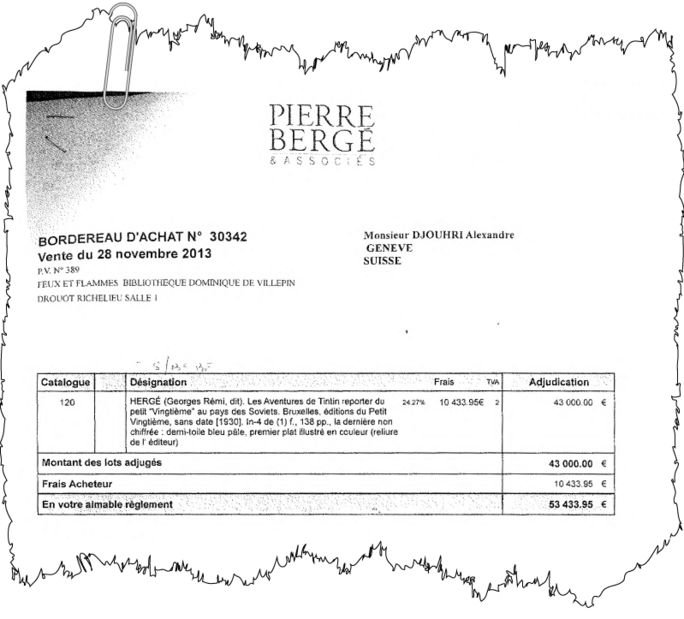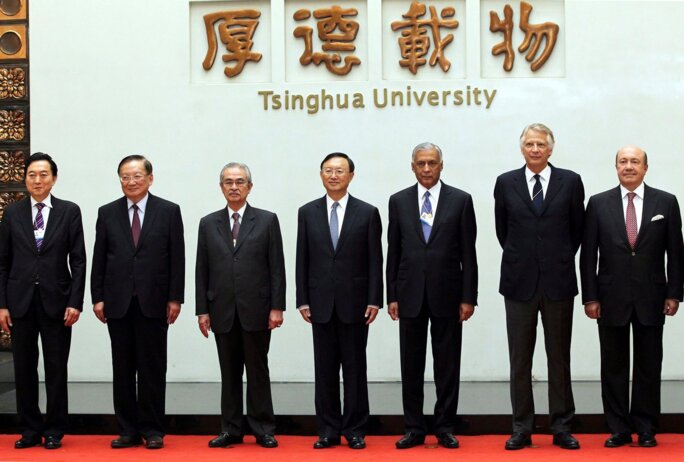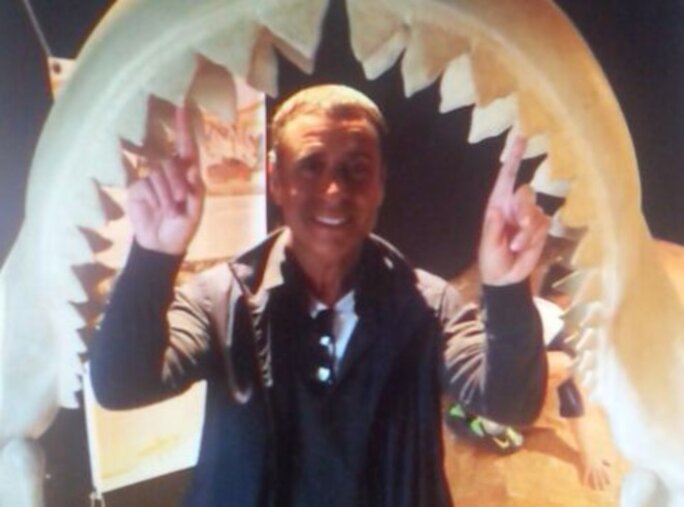Former French prime minister Dominique de Villepin is facing questions after investigators discovered that nearly half a million euros were paid into his bank account from money that originated in a Libyan state fund. Mediapart can reveal that a payment of 489,143 euros was transferred to Villepin by middleman Alexandre Djouhri in 2009, with the money originally coming from the Libyan African Investment Portfolio (LAP), one of the main investment arms of the Muammar Gaddafi regime.
According to investigators that money was part of the 10.1 million euros that Djouhri received from the LAP for the sale of his villa at Mougins near Cannes, even though the property was valued at only 2 million euros.
This suggests that the money received by Dominique de Villepin came from the same source as the 500,000 euros used by Claude Guéant, ex-interior minister and former right-hand-man of President Nicolas Sarkozy, to buy a flat in Paris in 2008. Guéant, who has claimed his sudden influx of funds came from the (fictitious) sale of two Flemish paintings, was placed under formal investigation in March 2015 for “laundering of the proceeds of tax fraud as part of an organised gang”, “forgery” and “use of false instruments”.
According to the official investigation, which is probing claims that Gaddafi's regime helped fund Sarkozy's 2007 election campaign, Guéant's money came from a Saudi Arabian bank account that later had a similar sum transferred into it by Djouhri via those LAP funds. Gaddafi's chief-of-staff, Bashir Saleh, who at the time was president of the LAP, and who has now sought refuge in South Africa, also paid an additional 4.9 million euros into various bank accounts used by Djouhri, bringing the total amount of Libyan money received by the middleman between 2008 and 2010 to 15 million euros.

Enlargement : Illustration 1

It is thus through the involvement of Alexandre Djouhri that Dominique de Villepin has now been dragged into the same judicial investigation as Guéant and Villepin's former great rival Nicolas Sarkozy. The former president's alleged role in the Libyan affair has been highlighted by another intermediary, Ziad Takieddine, who claims he delivered a suitcase of Libyan cash to Sarkozy.
Mediapart has already revealed extracts from judicially-authorised telephone taps of Alexandre Djouhri, which show how long-time rivals Villepin and Sarkozy have got back in contact with each other, and how the middleman organised lunches involving the two men. Djouhri was himself summoned for questioning by the investigating judges last September but did not turn up and appears to have left Paris since Guéant was put under investigation more than 18 months ago.
Investigators from the anti fraud and corruption squad, the Office Central de Lutte Contre la Corruption et les Infractions Financières et Fiscales (OCLIFF) did however question Dominique de Villepin on September 6th, 2016, about the payment and his relationship with Djouhri. He said he had “friendly” relations with the middleman whom he had met “between 1993 and 1995”. But he denied any business relationship with him. “I have no links with M. Djouhri's professional activities,” said the former prime minister, who said he was not even aware of the latter's line of business.
Yet investigators have proof of the payment made by Djouhri to Villepin. And several phone taps leave little room for doubt that the two had conversations that touched on the subjects of both business and money. They show, for example, the insistence on Villepin's part that Djouhri completed the purchase of an original Tintin comic book ('Tintin au pays des Soviets') sold at auction in 2013 by the ex-premier. The sale of Villepin's collection of old books raised around 3 million euros. As Le Monde has already noted, the purchase of the book seems to have been carried out through a third party. And the telephone conversations showed Djouhri's obsession with not paying in his own name or being seen to buy in his own name. This was despite the fact that it appears on a bill of sale. The payment was made through a Dubai-based company called Iscande, of whose existence Villepin says he was unaware.

Enlargement : Illustration 2

A phone conversation recorded in February 2015 between Villepin and Djouhri also showed they had common business interests. Villepin informs the middleman that a mutual acquaintance is interested in buying a banking or insurance business. The former PM proposes advising the man to buy a Luxembourg fund that owns a bank and two small insurance companies and informing him that “Alexandre is in the process of buying that”. Villepin says that the man can then buy the whole package. He adds that Djouhri should mention a figure of “around 150 million euros” to the other man.
When questioned by Mediapart on this and other questions, Villepin did not respond.
Writer, businessman and lecturer
Having left politics – he was prime minister under President Jacques Chirac – Dominique de Villepin set up a legal practice in January 2008 under the name Villepin International. In 2015 he resigned from the Bar and focused his attention on commercial affairs.
Villepin, who has also written eight books since 2008, has won consultancy deals with some major industrial groups such as Total, Alstom and Veolia. He has also occupied positions with companies abroad and was chairman of the advisory committee at the Universal Credit Rating Group and sat on the global advisory committee of the Chinese investment fund China Minsheng. In 2015 Villepin International had a turnover of 1.6 million euros, employed three staff and made a profit of 304,251 euros.
When the company started one of its clients was the Saudi group run by Khaled Bugshan, who is believed to have sent the money that Claude Guéant used to buy his flat in 2008. “I met Khaled Bugshan in 2008 in my capacity as a lawyer,” Villepin told the investigating officers last September. “Before that I didn't know him at all, even though I knew the Bugshan group by reputation. I accompanied the Bugshan group in the regions where they are already based such as, for example, Morocco.” Villepin said he went on “numerous” trips of this type around the world, one or two a month, thanks to a consultancy that brought him in 800,000 euros a year from 2008 to 2010.
The police investigators told the former prime minister that their inquiries had established that Alexandre Djouhri was able to use the bank accounts of Khaled Bugshan and his cousin Ahmed Bugshan. “Was the contract that associated you with the Bugshan group hiding the relationship that you had with M. Djouhri?” they asked him. Villepin said this was not the case as he dealt directly with the Saudi businessman. “It's Khaled Bugshan who signed the contract and it's he who settled the bills,” said the ex-premier, before admitting that he most often dealt with the banker Wahib Nacer, a former boss of the bank Crédit Agricole in Geneva, who is the manager of the Bugshan accounts and is close to Alexandre Djouhri.
Villepin said that Djouhri might have “recommended” his firm to Khaled Bugshan, but suggested his involvement was nothing more than that. The detectives then pointed to the fictitious nature of the services provided to Bugshan, including a memo from 2009 whose title was “word for word” that of a lecture Villepin had given the previous year. The former prime minister said that general notes were sometimes useful to help one reflect on an issue or meet a particular need for an issue that concerned the Bugshan group, and he said that he might reused some of his lecture notes in this way.

Enlargement : Illustration 3

Le Monde has identified the lecture in question as one Villepin gave at the Asian Mayors Forum held in Tehran in November 2008. After books and business affairs, international conferences were Dominique de Villepin's third professional activity and it seems likely that drawers at the offices of Villepin International were filled with “these types of notes based on conferences”.
However, the main focus of the investigators when questioning Villepin last September 6th was on the Libyan funding affair and more particularly on the fact that funds originally from the Libyan African Portfolio (LAP) had arrived in the former prime minister's bank account via Alexandre Djouhri. “We've noticed that one of your bills (489,143 euros issued 29/09/09), though addressed to the Bugshan group, had been paid by the Swiss account of a company called Bedux, registered in Panama. What can you tell us about this company?” they asked.
“I don't know this company Bedux,” replied Villepin. “Each time we monitor the traceability to ensure that the payments are indeed from Khaled Bugshan's accounts.”
The investigators then continued: “It seems that the company Bedux is a shell company with a Swiss bank account which was created in order to obscure the sale by Alexandre Djouhri of a villa situated in the commune of Mougins to the Libyan investment fund run by Bashir Saleh (LAP). This was a suspect transaction in the sense that the price was greatly above the villa's value, even more so as the property was blighted by a tax liability. This property was valued at less than 2 million euros, the tax liability at the time approached 1.5 million euros and the transaction was concluded for 10,140,000 euros. It was a part of these funds that found their way directly from Bedux's Swiss bank account to your bank account at LCL [editor's note, a bank] in Paris. How can you explain that?”
Villepin replied: “I'm flabbergasted, I know nothing about this case. I recently learnt that Djouhri had a property at Mougins but I only know what I read in the press.”
The Libyan purchase of Djouhri's villa was carried out with the authority of the LAB's president Bashir Saleh. The investment fund's archives seized by French judicial investigators still show evidence of talks carried out by Saleh from the start of 2008. On May 20th, 2008, a contract of sale was signed between Bedux, represented by Djouhri's banker friend Wahib Nacer, and the Swiss arm of the LAP relating to the sale of shares of the villa's controlling company, for a price of 10 million euros.
Was the purchase of the Mougins villa a way of hiding retro-commissions?
The villa at Mougins near Cannes in the South of France, which had been abandoned for many years, had belonged to Nabila Khashoggi, daughter of the Saudi billionaire and arms dealer Adnan Khashoggi. It was then bought by Alexandre Djouhri in 1998 for the equivalent of 700,000 euros. According to the French investigation the middleman had met Nabila Khashoggi at the Paris nightclub Régine. He had wanted to buy the villa almost immediately, as he had plans to make it a place where he could look after important figures from abroad. That was the idea he sold to the Libyans. In many people's view, the purchase of the villa was simply a means of hiding the inflow of retro-commissions or backhanders.
After July 21st, 2008 a total of 3.1 million euros was transferred by the LAP into the Bedux account. In his office in Geneva banker Wahid Nacer scrawled the initials 'AD' against the credit note for Bedux, before putting the money in the Bugshan account.
In 2008 the LAP made three transfers to Djouhri's accounts, totalling 4,850,000 euros. One of these payments, made in December 2008, was split between the accounts of Khaled and Ahmed Bugshan before being quickly withdrawn in cash – in two amounts of 200,000 euros and 300,000 euros – using the initials 'AD'. These first payments by the LAP were covered by a payment of 4.9 million euros to the fund from Bashir Saleh's personal account in December 2008.

Enlargement : Illustration 4

The villa transaction came to fruition some months later. In May 2009 Saleh sent Wahib Nacer the instruction to carry out the transfer of the 10.1 million euros from the LAP account relating to the sale of the Mougins villa. Nacer was in effect banker to the Bugshans, to the LAP, to Saleh and to Djouhri. But it was only on September 14th, 2009, that the money was paid to Bedux. And it was on September 30th, 2009, that Bedux transferred 489,143 euros to Villepin International.
“The acquisition by the LAP, funds held by the Libyan state, of a property without any economic value at an excessive price … seems to constitute an offence of embezzling Libyan public funds,” the investigators said in a summary of the investigation submitted in September last year. They said the interposing of Ahmed Bugshan then Bedux between Alexandre Djouhri and the LAP was aimed at hiding the origin of the property for the LAP and the destination of the funds sent by the LAP to Bedux. “The agreement of Bashir Saleh to carry out this transaction in spite of all good economic sense by increasing the number of measures to hide it in relation to Tripoli can only be explained by the freedoms granted to him at the time when it was decided to sell the house at an overvalued price to the LAP,” notes the OCLCIFF unit. It also highlighted the expenses run up by Saleh during stays at the Ritz hotel in Paris between 2007 and 2008.
OCLCIFF also points out that “a part of the funds coming from Bedux was transferred on behalf of M Djouhri in 2010 to the Saudi account of Khaled Bugshan from where came the 500,000 euros received by the secretary general of the Elysée [editor's note, Claude Guéant] for his paintings.” The investigators suggest that this might have been a reimbursement of the 500,000 euros of Libyan funds that had been sent to Guéant in 2008 from that same Khaled Bugshan account at the National Commercial Bank in Jeddah. Once again the written notice of the transaction was marked with the initials “AD”.
During Dominique de Villepin's questioning the investigators recalled that Alexandre Djouhri had been one of the middlemen in the 2006 sale by EADS – now called Airbus – of twelve aircraft to the Libyan airline Afriqiyah Airway of which the LAP was the major shareholder. Citing journalist Pierre Péan, who has written a book about Djouhri ('La République des mallettes' published by Fayard in 2011'), they said the middleman claimed 12 million euros for his role in the sale. Villepin – who was prime minister at the time of the deal - was unable to tell them what “service” Djouhri performed to warrant such a payment. The investigators have established that Claude Guéant approached EADS to support Djouhri in relation to his demands.
Villepin, meanwhile, also knew the head of the LAP, Bashir Saleh. The investigators reminded him that in 2011, as war raged in Libya, the former prime minister had made “some approaches to Bashir Saleh” with a view to negotiate a “peaceful end to the conflict”. In relation to this initiative Alexandre Djouhri had accompanied Villepin on some trips to Djerba in Tunisia.
Dominique de Villepin told detectives that the middleman had not played any role in the substance of the initiative. “Alexandre Djouhri knew Bashir Saleh and, moreover, he knew Claude Guéant,” he told them. “[Guéant] let me know that this mission was approved of by the president of the Republic [editor's note, Nicolas Sarkozy] whom incidentally I had already met at this time. These meetings with Bashir Saleh took place more at the end of the war, between July and August 2011, either in Tunisia or Paris, during the most difficult period when everything seemed blocked. These meetings were approved of by Gaddafi, with the whole difficulty being that the Libyan leader didn't want to quit power and leave Tripoli.”
Villepin said that after the war he had only met Bashir Saleh “by chance”, at the Ritz in Paris, at a time when the Libyan was on Interpol's wanted list. That was before Saleh himself fled France in May 2012, under the double protection of France's domestic intelligence chief, Bernard Squarcini and Alexandre Djouhri.
--------------------------------------------------------------------------
- The French version of this article can be read here.
English version by Michael Streeter


